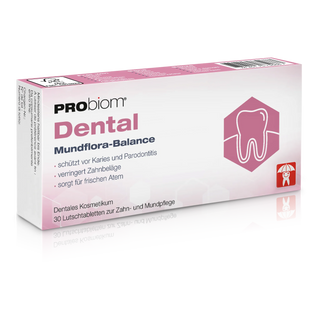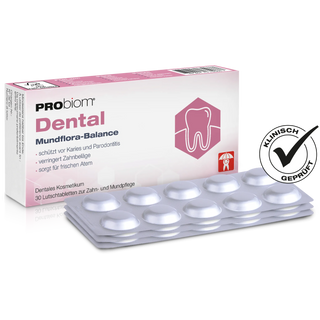The health of our bodies depends heavily on the balance of microbes that live in and on us. While the gut microbiome has received a lot of attention in recent years, the oral microbiome is now also coming into focus. New research shows that oral health has effects far beyond the mouth and throughout the body. The role that probiotics can play in this is particularly exciting.
Oral and intestinal microbiome: The close connection
The mouth is the gateway to the digestive tract and therefore an important interface between the outside world and the body's internal ecosystem. Every day, billions of bacteria enter the gastrointestinal tract from the oral cavity through the swallowing of saliva and food. This means that the oral microbiome can have a direct influence on the composition of the gut microbiome.
The journey of bacteria from the mouth to the intestine
The microbes in the mouth - including both beneficial and potentially harmful bacteria - can enter the gastrointestinal tract through swallowing and affect the microbiome there. While some beneficial bacteria can withstand the acidic conditions in the stomach and colonize in the intestines, pathogenic bacteria that originate from a disrupted oral microbiome can trigger inflammatory responses in the body.
Probiotics as a protective shield
Oral probiotics, such as Streptococcus salivarius , can not only improve the oral flora, but also help to promote balance in the intestines. These microbes produce substances that inhibit the growth of harmful germs while modulating the immune system. Their positive effects can be felt both locally in the mouth and systemically throughout the body.
Systemic Effects of Oral Health
cardiovascular diseases
Poor oral health, particularly due to periodontal disease, is associated with an increased risk of cardiovascular disease. Inflammatory markers triggered by oral infections can travel through the bloodstream to other parts of the body and promote inflammation there.
diabetes and metabolic disorders
The oral microbiome also influences glucose metabolism. A disturbed oral microbiota can promote inflammation, which impairs insulin sensitivity and increases the risk of type 2 diabetes. Probiotics can help here by reducing inflammatory markers and improving blood sugar control.
immune system strengthening
The immune system is regulated by both the gut and oral microbiome. Oral probiotics can stimulate the production of anti-inflammatory cytokines, leading to a better immune response to infections.
Practical Application of Oral Probiotics
- Lozenges : These products often contain probiotic strains such as Streptococcus salivarius and are easy to integrate into everyday life.
- Mouthwashes with probiotics : Regular use can improve the balance of oral flora while providing systemic benefits.
- Toothpaste with probiotics: Probiotic toothpastes are also an effective alternative to improve the oral flora and thus build up protection against systematic diseases.
Conclusion
The connection between the oral and gut microbiome highlights the importance of not looking at oral health in isolation. Oral probiotics offer a promising way to support balance throughout the body, reduce inflammation, and strengthen the immune system. Future research may further underscore the importance of these microbes for holistic health and open up new ways to promote overall health.













